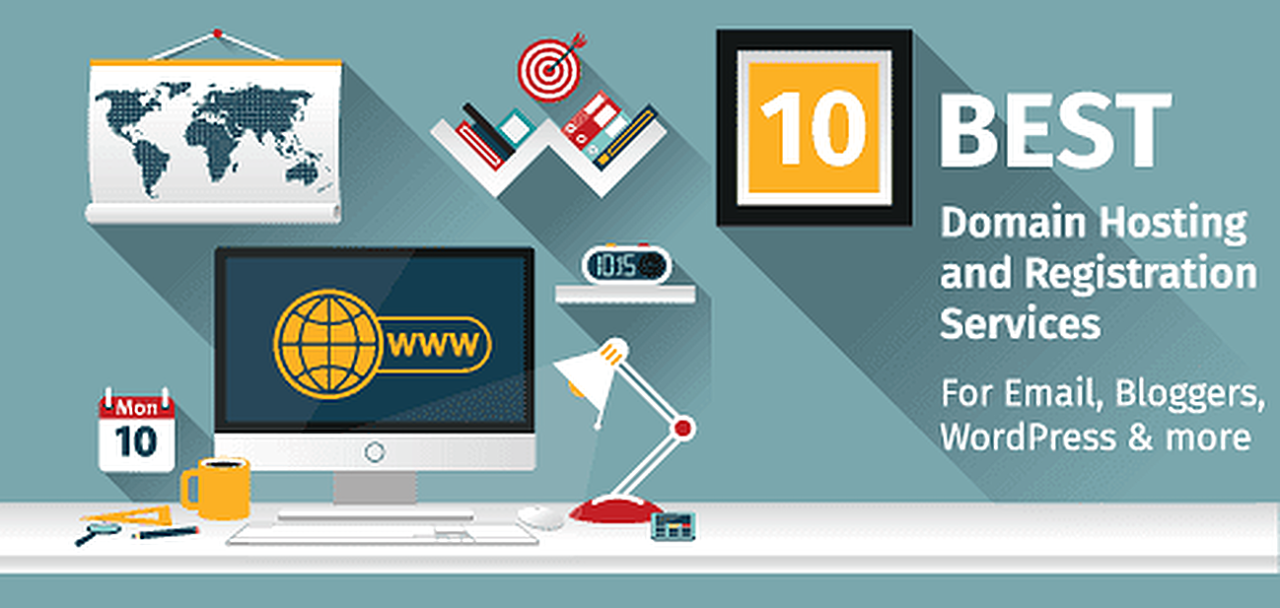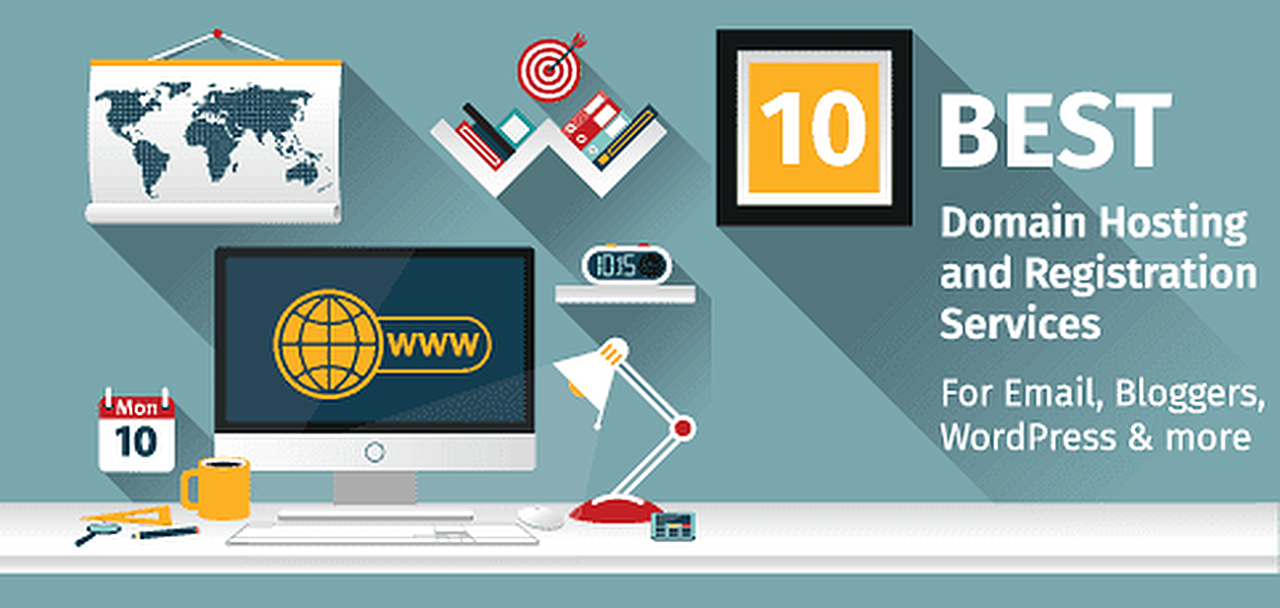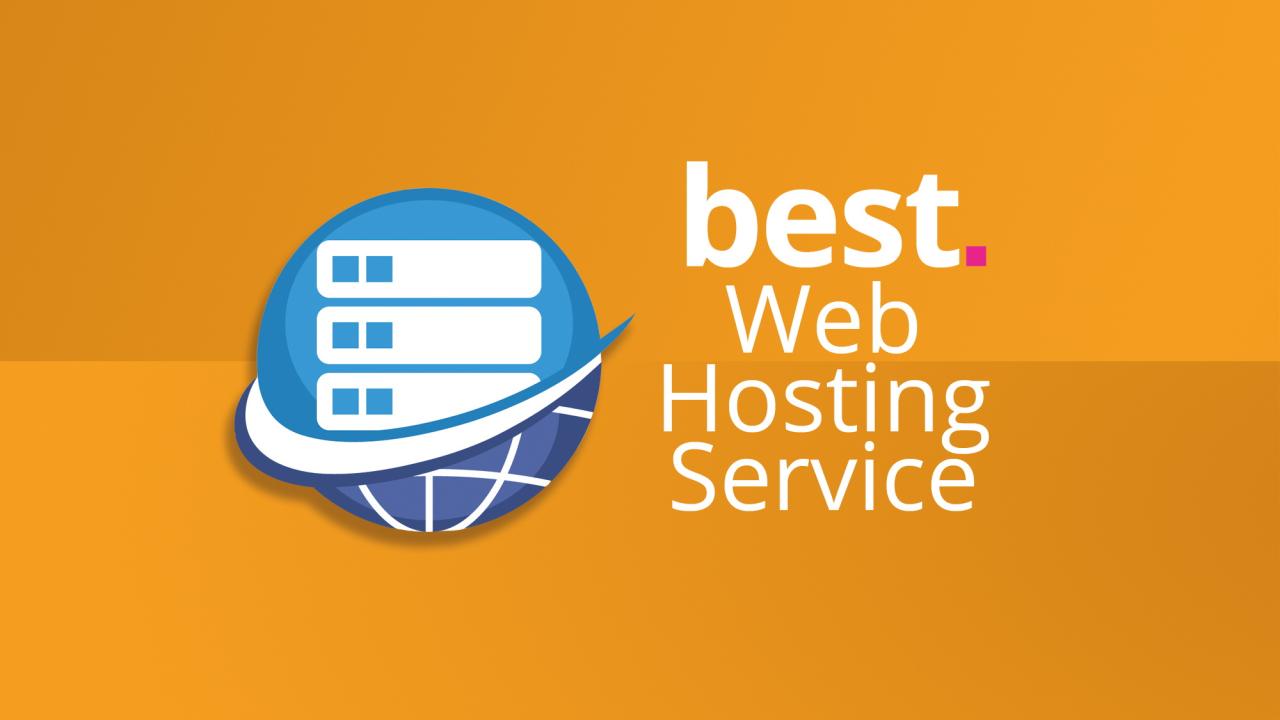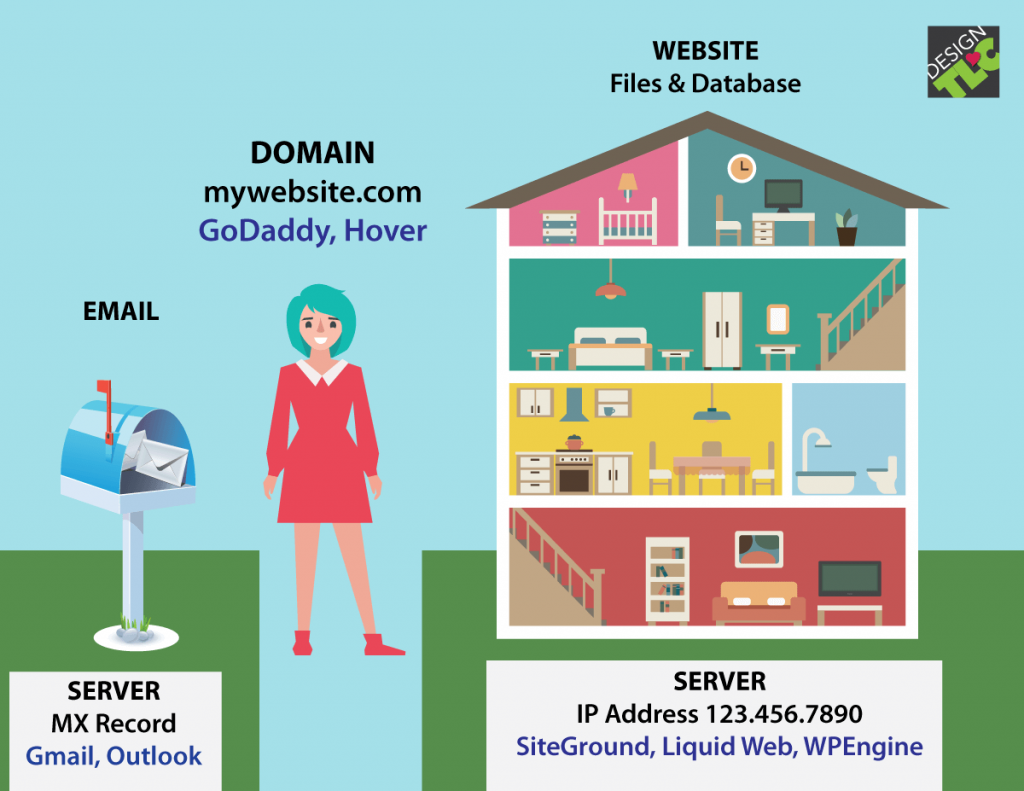Best domain hosting sets the stage for a successful online presence, offering the foundation upon which your website thrives. Choosing the right hosting provider is crucial for website performance, security, and overall user experience. This guide delves into the world of domain hosting, exploring various types, essential features, and top providers to help you make an informed decision.
From understanding the different hosting plans to optimizing website performance, we’ll cover key aspects that influence your website’s success. We’ll also discuss the importance of website security, domain name registration, and the role of customer support in ensuring a smooth and reliable online experience.
Understanding Domain Hosting
Domain hosting is the backbone of your online presence. It’s the service that makes your website accessible to the world. When you register a domain name, you’re essentially reserving a unique address on the internet. Domain hosting, on the other hand, provides the physical space and resources to store your website’s files and make them available to visitors.
Types of Domain Hosting Services
Domain hosting services are available in different forms, each tailored to different needs and budgets. Here’s a breakdown of the most common types:
- Shared Hosting: This is the most affordable option, where multiple websites share the same server resources. It’s suitable for basic websites with low traffic volume.
- VPS Hosting: Virtual Private Server (VPS) hosting provides a dedicated portion of a server’s resources, offering more control and performance than shared hosting. It’s ideal for websites with moderate traffic and specific software requirements.
- Dedicated Hosting: In dedicated hosting, you get an entire server exclusively for your website. This provides the highest level of performance, security, and control, making it suitable for high-traffic websites and demanding applications.
- Cloud Hosting: Cloud hosting utilizes a network of servers to distribute your website’s workload, ensuring high availability and scalability. It’s a flexible option for websites with fluctuating traffic and resource demands.
Factors to Consider When Choosing a Domain Hosting Provider
Selecting the right domain hosting provider is crucial for your website’s success. Here are some key factors to consider:
- Reliability: A reliable hosting provider ensures your website is consistently accessible to visitors. Look for providers with a proven track record of uptime and minimal downtime.
- Uptime: Uptime refers to the percentage of time your website is online and accessible. Aim for a hosting provider with an uptime guarantee of at least 99.9%.
- Security: Security is paramount for protecting your website and its data from cyber threats. Choose a provider with robust security measures like firewalls, malware protection, and regular backups.
- Customer Support: Responsive and knowledgeable customer support is essential for resolving any technical issues or answering your questions promptly. Look for providers with 24/7 support channels like live chat, phone, and email.
- Pricing: Consider the cost of hosting services in relation to your website’s needs and budget. While cheaper options may be tempting, prioritize reliability and performance over the lowest price.
Choosing the Right Hosting Plan
Selecting the appropriate hosting plan is crucial for ensuring your website’s performance, security, and scalability. Several factors come into play when making this decision, each influencing the type of hosting that best suits your specific needs.
Factors Influencing Hosting Plan Choice
The choice of a hosting plan depends on several factors, including your website’s traffic volume, resource requirements, and budget.
- Website Traffic: The amount of traffic your website receives is a significant factor in determining the hosting plan you need. High-traffic websites require more resources, such as processing power and bandwidth, to handle the increased demand.
- Resource Requirements: Different websites have varying resource requirements. Websites with complex functionalities, such as e-commerce platforms or large databases, demand more resources than simple static websites.
- Budget: Hosting plans come with varying costs, and it’s essential to consider your budget constraints when making your choice. While budget-friendly shared hosting plans might be suitable for small websites, high-traffic websites might require more expensive dedicated or cloud hosting solutions.
Types of Hosting Plans
Different hosting plans cater to specific needs and offer varying levels of resources and control.
- Shared Hosting: This is the most affordable option, where multiple websites share the same server resources. Shared hosting is suitable for small websites with low traffic and basic functionalities.
- VPS Hosting: VPS hosting provides a virtualized server environment, offering more resources and control than shared hosting. Websites with moderate traffic and resource requirements benefit from VPS hosting.
- Dedicated Hosting: In dedicated hosting, you have an entire server dedicated to your website, providing maximum resources and control. Dedicated hosting is suitable for high-traffic websites, e-commerce platforms, or websites with demanding resource requirements.
- Cloud Hosting: Cloud hosting utilizes a network of servers to distribute resources, providing scalability and flexibility. This option is ideal for websites with fluctuating traffic or high resource demands.
Choosing the Right Plan
- Traffic Volume: If your website receives high traffic, consider dedicated or cloud hosting for optimal performance.
- Resource Requirements: Websites with complex functionalities, such as e-commerce platforms or large databases, require more resources and might benefit from VPS, dedicated, or cloud hosting.
- Budget: Shared hosting is the most budget-friendly option, while dedicated and cloud hosting solutions are more expensive. Choose a plan that aligns with your budget constraints.
- Scalability: Consider the potential growth of your website and choose a plan that offers scalability options. Cloud hosting is highly scalable and can adapt to fluctuating traffic demands.
- Control: If you require more control over your server environment, VPS or dedicated hosting might be suitable.
Website Performance Optimization
In the digital landscape, website performance is paramount. A fast-loading, responsive website significantly impacts user experience and search engine rankings. Optimizing website performance ensures visitors stay engaged, convert into customers, and contribute to a positive brand image.
Website Speed and Loading Times
Optimizing website speed and loading times is crucial for user engagement and search engine rankings. Users expect websites to load quickly, and slow loading times can lead to frustration and abandonment.
- Minimize HTTP Requests: Each element on a webpage, such as images, scripts, and stylesheets, requires an HTTP request. Reducing the number of requests can significantly improve loading times. Combine CSS and JavaScript files, optimize images, and use a content delivery network (CDN) to reduce the number of HTTP requests.
- Optimize Images: Images are often the largest files on a webpage, contributing significantly to loading times. Compress images without compromising quality using tools like TinyPNG or ImageOptim. Use appropriate image formats like WebP, which offers better compression ratios than JPEG or PNG.
- Enable Browser Caching: Browser caching allows users to store website assets locally, reducing the need to download them again on subsequent visits. Configure caching headers to specify how long assets should be cached, optimizing website speed for returning visitors.
- Minimize Code: Remove unnecessary code, comments, and whitespace to reduce the size of HTML, CSS, and JavaScript files. Minify code using online tools or plugins to optimize file sizes and improve loading times.
- Optimize Fonts: Large font files can slow down website loading. Use web fonts sparingly, choose efficient font formats like WOFF2, and preload fonts for critical content to ensure fast rendering.
Content Delivery Networks (CDNs)
CDNs play a vital role in enhancing website performance by distributing website content across multiple servers globally. When a user accesses a website, the CDN delivers content from the server closest to their location, reducing latency and improving loading times.
- Reduced Latency: CDNs minimize the distance between the user and the server, reducing latency and improving website responsiveness. This is particularly beneficial for users located far from the website’s origin server.
- Increased Bandwidth: CDNs provide additional bandwidth, handling traffic surges and ensuring smooth website performance even during peak periods. This is crucial for websites experiencing high traffic or experiencing sudden spikes in demand.
- Improved Security: CDNs offer security features like DDoS protection, SSL certificates, and content caching, enhancing website security and protecting against malicious attacks.
- Global Reach: CDNs distribute website content across multiple locations worldwide, ensuring fast delivery and optimal performance for users regardless of their geographical location. This is essential for businesses with a global audience.
Domain Name Registration and Management

Securing a domain name is a crucial step in establishing your online presence. It’s your website’s unique address on the internet, allowing users to easily find and access your content. This section delves into the process of registering a domain name and managing it effectively.
Choosing a Domain Registrar
Selecting the right domain registrar is essential for a smooth and secure domain registration experience. Domain registrars are companies that provide the service of registering and managing domain names. They act as intermediaries between you and the Internet Corporation for Assigned Names and Numbers (ICANN), the organization that oversees the domain name system.
When choosing a domain registrar, consider the following factors:
- Reputation and Reliability: Opt for a reputable registrar with a proven track record of reliability and customer service. Look for reviews and testimonials from other users.
- Pricing and Features: Compare pricing plans and features offered by different registrars. Some may offer additional services like domain privacy, website builders, or email hosting.
- Ease of Use: Choose a registrar with a user-friendly interface and intuitive tools for managing your domain name.
- Customer Support: Ensure the registrar provides adequate customer support channels, such as live chat, email, or phone, to assist you with any issues or questions.
Domain Name Privacy and Protection
Protecting your personal information associated with your domain name is crucial for privacy and security. Domain privacy protection services, offered by most registrars, mask your personal details from public view.
- Whois Privacy: The Whois database publicly displays information about domain name registrants, including their name, address, and contact details. Domain privacy services replace this information with the registrar’s details, shielding your personal information from unwanted access.
- Domain Lock: This feature prevents unauthorized transfers of your domain name to another registrar without your explicit permission. It adds an extra layer of security to safeguard your domain.
Managing and Maintaining Domain Names
Effective domain name management involves a combination of regular tasks and proactive measures to ensure your domain remains secure and functional.
- Renewal Notifications: Set up renewal reminders to avoid domain name expiration. Most registrars offer automated notifications via email or text message.
- Domain Name Updates: Keep your contact information up to date with your registrar to receive important notifications and prevent issues with domain ownership.
- Security Measures: Regularly monitor your domain name for any suspicious activity or unauthorized access. Implement strong passwords and two-factor authentication to enhance security.
Website Security and Maintenance: Best Domain Hosting

In today’s digital landscape, website security and maintenance are crucial for protecting your online presence and ensuring a positive user experience. A secure and well-maintained website not only safeguards your data and your visitors’ information but also fosters trust and confidence in your brand.
Website Security Vulnerabilities and Mitigation
Website security vulnerabilities can expose your website to various cyber threats, including data breaches, malware infections, and denial-of-service attacks. Understanding these vulnerabilities and implementing appropriate mitigation strategies is essential.
- Cross-Site Scripting (XSS): This vulnerability allows attackers to inject malicious scripts into your website, potentially stealing user data or compromising website functionality. To mitigate XSS, use input validation and output encoding to sanitize user input and prevent the execution of malicious scripts.
- SQL Injection: Attackers exploit SQL injection vulnerabilities to manipulate database queries and gain unauthorized access to sensitive information. Employ parameterized queries or prepared statements to prevent SQL injection attacks by separating user input from database commands.
- Insecure Direct Object References (IDOR): IDOR vulnerabilities occur when a website exposes sensitive data or functionalities through predictable URLs. Implementing proper authorization controls and ensuring that all access requests are validated can effectively mitigate IDOR risks.
- Weak Passwords: Using weak or easily guessable passwords can make your website vulnerable to brute-force attacks. Encourage users to create strong passwords using a combination of uppercase and lowercase letters, numbers, and symbols. Implement password complexity requirements and enforce regular password changes.
Website Maintenance and Backups
Regular website maintenance and backups are crucial for ensuring website stability, performance, and data protection. A comprehensive maintenance plan includes routine updates, security checks, and data backups.
- Regular Updates: Keep your website software, plugins, and themes updated to patch security vulnerabilities and improve performance. Regular updates ensure that your website is protected against the latest threats and exploits.
- Security Checks: Perform regular security scans to identify potential vulnerabilities and malware infections. Use reputable security tools and services to scan your website for known vulnerabilities and malicious code.
- Data Backups: Create regular backups of your website files and database to protect your data from accidental deletion, hardware failures, or cyberattacks. Implement a reliable backup strategy and store backups in a secure off-site location.
Cost-Effective Domain Hosting Solutions
Finding affordable domain hosting options is crucial for small businesses and individuals on a budget. While high-end hosting providers offer extensive features, budget-friendly alternatives can still deliver reliable performance and essential tools. This section explores cost-effective domain hosting solutions, highlighting their advantages and drawbacks, and offering tips to save money on hosting expenses.
Affordable Domain Hosting Options, Best domain hosting
Choosing a budget-friendly hosting provider doesn’t mean compromising on quality. Several reputable providers offer affordable plans tailored for specific needs. Here are some popular options:
- Shared Hosting: Shared hosting is the most cost-effective option, where multiple websites share resources on a single server. This approach makes it ideal for low-traffic websites or personal blogs. However, shared hosting can be slower and less secure than other options due to shared resources.
- Cloud Hosting: Cloud hosting provides flexibility and scalability by distributing resources across multiple servers. It’s a good choice for websites with fluctuating traffic, as it allows for dynamic resource allocation. While generally more expensive than shared hosting, some cloud providers offer affordable entry-level plans.
- VPS Hosting: VPS (Virtual Private Server) hosting provides a dedicated portion of a physical server, offering more resources and control than shared hosting. It’s a suitable option for websites with moderate traffic and specific resource requirements. VPS hosting is typically more expensive than shared hosting but less expensive than dedicated servers.
Benefits and Drawbacks of Budget-Friendly Hosting
Budget-friendly hosting providers offer attractive prices but come with certain trade-offs.
- Benefits:
- Lower Costs: The most significant advantage of budget-friendly hosting is the reduced cost, making it accessible for individuals and small businesses with limited budgets.
- Basic Features: Most budget-friendly providers offer essential features like website building tools, email accounts, and basic security measures.
- Easy Setup: Many budget-friendly providers offer user-friendly control panels and intuitive interfaces, making website setup and management straightforward.
- Drawbacks:
- Limited Resources: Budget-friendly hosting plans often come with limited storage space, bandwidth, and processing power, which can affect website performance, especially during peak traffic periods.
- Fewer Features: Budget-friendly providers may offer fewer advanced features, such as dedicated IP addresses, advanced security measures, and extensive customer support.
- Slower Performance: Websites hosted on shared servers can experience slower loading times due to shared resources and potential resource contention.
- Less Security: Budget-friendly providers may offer basic security features, but they might not provide robust security measures like dedicated firewalls and intrusion detection systems.
Tips for Saving Money on Domain Hosting Costs
There are several strategies to reduce domain hosting expenses:
- Choose a Longer Hosting Term: Many hosting providers offer discounts for longer subscription terms. Opting for a yearly or multi-year plan can save significant money in the long run.
- Look for Promotions and Discounts: Keep an eye out for promotional offers, seasonal discounts, and special deals from hosting providers. These can significantly reduce hosting costs.
- Bundle Domain and Hosting: Some hosting providers offer discounts when you bundle domain registration with hosting services. This can save money compared to purchasing these services separately.
- Optimize Website Performance: A well-optimized website loads faster and consumes fewer resources, reducing hosting costs. Optimize images, compress files, and use caching plugins to improve website performance.
- Consider Free Hosting Options: For basic websites or personal blogs, free hosting options can be a viable alternative. However, free hosting usually comes with limited features, storage, and bandwidth, and may display advertisements on your website.
Final Thoughts
Navigating the world of domain hosting can seem daunting, but with a clear understanding of your needs, you can confidently choose the best solution for your website. By considering factors like website traffic, resource requirements, and budget, you can select a hosting plan that meets your current and future needs. Remember, the right domain hosting provider is essential for building a robust, secure, and high-performing online presence.





